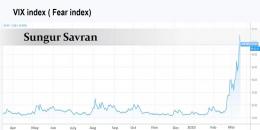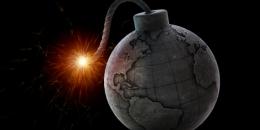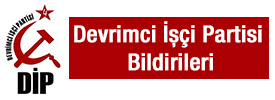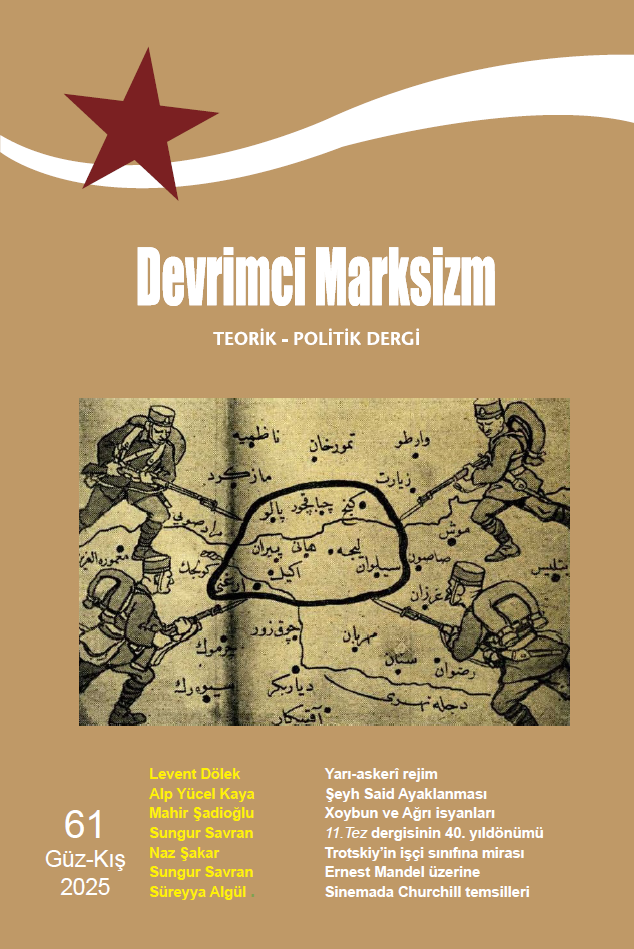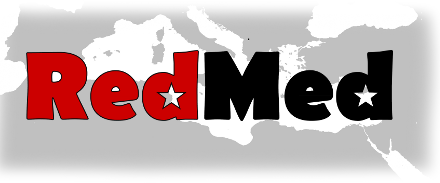2019: Humanity’s race against itself deepens (1): crisis, war, instability
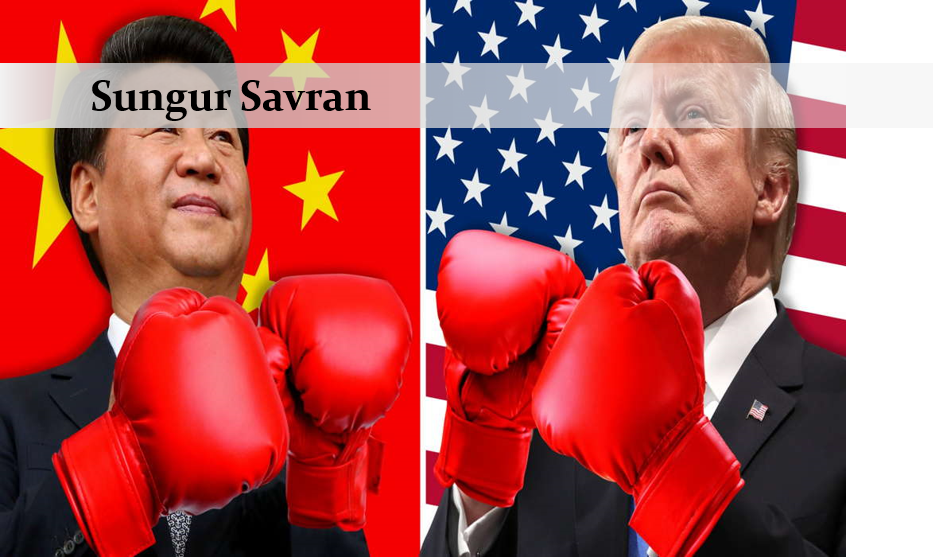
The article below has been written for publication in the first issue of a new online journal, Советское Возрождение (Sovetskoe Vozrozhdenie - Soviet Renaissance) to be produced in Russia. This journal has now been published and posted on RedMed as well as in Russia. The article was originally penned in English and was translated into Russian. This is Part 1 of the original article. Part 2 will be posted on RedMed subsequently.
We are racing against ourselves, oh beloved,
Either we will take life to dead stars or death will descend on our planet.
Nazim Hikmet
The year 2019 will surely be remembered for the plethora of mass uprisings and mobilisations over the face of our planet, from France to Sudan and from Chile to Iran. This renewed sense of revolt and revolution has brought a sense of optimism and hope to those fighting against exploitation, oppression and discrimination. However, this trend is developing against a background of continuing threats of deepening economic crisis and impoverishment, of wars small and large, and of the rise of fascism and reaction. It is only through a multifaceted analysis of the different tendencies, positive and negative, that one can understand the stakes and the contradictions presented by the material objective circumstances of our period.
The threat of a new crash in the world economy
The fundamental element of the world situation is that we are still going through the period of what we have labelled the “Third Great Depression” in the history of capitalism (after the so-called Long Depression of late 19th century and the Great Depression of the 1930s and 1940s). This was opened up by the so-called “global financial crisis” of 2008, a near crash of the world’s financial system. The economics establishment tried to dodge the “D-word”, depression, by hurriedly labelling it the “Great Recession”, an obvious misnomer since the world and its regions and single countries have gone through not one great recession but a multiplicity of recessions since 2008.
What is specific about “Great Depressions” in the history of capitalism is that they are such wide-ranging and profound crises that a simple set of economic interventions on the part of governments, however well-thought out and implemented in unison, cannot bring about a recovery of the world economy from its crisis. The “Great Depression” is the result of the historic decline of the capitalist mode of production, which requires comprehensive planning on the international arena because of the unquestionable socialisation of the productive forces, whereas capitalism doggedly resists central planning and tries to sustain the principle of private appropriation of the social surplus based on capitalist private property and generalized commodity production. Because this contradiction is so historic and unresolvable in its nature, the Great Depression requires a wholesale revamp of the economic, political, ideological, even military relations that existed before the onset of the crisis. The extraordinary nature of the phenomena we have been witnessing since 2008 is but a consequence of this decisive contradiction.
The Great Depression has robbed the large working masses of not only the poorer countries and regions of the world, but also of the rich imperialist countries, of the last reserves of survival they possessed before the crisis. The clearest sign that we are going through a classical phase of an over-accumulation crisis is the fact that there are trillions of dollars of excess funds in the hands of capitalists that do not get invested, but are either turned into financial assets or, worse, outright hoarded in tax havens. Moreover, because the economic crisis is so stubborn in wreaking havoc and will not go away, it threatens to bring the world economy once again to the brink of collapse. The so-called “global financial crisis” was only thwarted by recourse to an extremely high level of activism on the part of the governments, and in particular the central banks, of all countries, and this, ironically, at the end of a long period of neoliberalism when government intervention in the economy was completely derided and demeaned. But now governments and central banks are at the end of their breath as a result of a decade of low, even negative interest rates and so-called quantitative easing, which is but a hypocritical label for printing excess money, plus activist fiscal policy, all this leading to the greatest peace time public debt, in addition to soaring private debt, in history. We are now back to square one: there is yet another bubble building in the stock markets of the world and bourgeois governments are facing a catch-22 situation. Either continue with an easy money policy, which risks giving rise to a financial collapse even more serious than the one in 2008, or tighten monetary policy, which is a recipe for a deep recession the world is hardly ready to countenance, given all the contradictions that it is already facing.
2019 has seen all the wise men of capitalism, starting with its venerable institutions such as the IMF and the OECD, give warnings of trouble ahead for the world economy. The European economy is now going back to zero growth after a brief interregnum and even China has seen its growth rate slowing relatively speaking. The anomaly is really the United States of Trump, but it is difficult for the US to hang on to its high growth under the given circumstances. This economic situation obviously threatens to sharpen the contradictions that capitalism has been suffering from since the beginning of the Third Great Depression.
Preludes to World War III
The days full of merry-making when, at the turn of the millennium, the capitalist world was celebrating the “end of history” are over. It is now a race for survival that has started. In a stagnant world market, the rivalry that China puts up to imperialism is perceived as a real threat. Gone are the days when imperialist powers befriended Russia and China, to help them restore capitalism all the more swiftly. These two powers, both products of processes of socialist construction now spent, are perceived as threats by the imperialist world. Although the fire is on both, there is a new trend within the international capitalist class that wishes to neutralise Russia so that China may be dealt with all the more effectively. This probably is the reason why Trump approaches Russia in a different manner than the earlier US administrations.
The problems that existed between imperialism and China are multiplying at a rapid pace. From the tug-of-war over the South China Sea and the delicate balancing act regarding North Korea, an important Chinese ally, the apples of discord have now extended to a spectrum of areas: the trade war between the US and China, the particular conflict over Huawei, the support extended by the Trump administration to Hong Kong, the subsequent move of the Taiwanese bourgeoisie towards a national particularism, and the allegations of Chinese repression of the Turkic Uighurs of Xinjiang are so many flashpoints around which the tension has been rising. The US is pursuing a very conscious policy of encirclement, isolation, and containment against China. It may even be said that this is the strategic axis of its planetary policy at this stage. 2019 has seen a spiralling of these contradictions, despite the probably temporary truce that has come towards the end of the year regarding the trade war. This obviously implies a build-up towards a conflict between these two powers, which cannot but turn into a world war if it were to erupt.
A renewed bout of tension with Russia is also not to be excluded. Despite the ambiguities of Trump’s policy regarding Russia, it should not be ignored that NATO is still a war machine that targets first and foremost this country of great military capability, in particular in the field of nuclear power. Here, the European Union is acting as the Trojan horse that carries the Transatlantic Alliance in its recesses wherever it reaches out to in Eastern Europe and the Balkans. Crumbling under the burden of its historic decline, therefore losing ground constantly to Asia and in particular these two giants in the economic sphere, capitalism cannot but resort to extra-economic means of pressure on them, relying heavily on the extraordinary military power of the United States, way above its nearest rivals.
The other flashpoint where capitalism has displayed its belligerent tendencies in 2019 was in the Middle East, in particular in its policies towards Iran. Ever since he took office at the beginning of 2017, Trump has been building a broad alliance against this country, trying to bring together the strangest bedfellows. Saudi Arabia, the United Arab Emirates, Egypt and other reactionary Sunni Islamic states were brought together in an alliance that includes Israel against Shia Iran and its allies in the region. The foremost objectives are to put an end to the threat that Iran poses for Israel and to bring down the foremost ally of Russia and China in the Middle East. Trump does not shirk from a full-scale Shia-Sunni war across the Middle East and beyond, a war that will possibly cost hundreds of thousands, if not millions, of lives and unspeakable devastation for the region. The Saudis and the UAE are already subjecting the people of Yemen to the most brutal destruction in their war against the Shia Houthis of that country. The sheer cruelty of that war, which has continued to rage in 2019, is a harbinger of the tragedy that a region-wide sectarian war could cause. 2019 has witnessed a heating up of the tension in the Persian Gulf, Iran taking the upper hand in a game of brinkmanship against the trio US, UK, and the Saudis.
Fortunately, one is tempted to say, many obstacles have arisen that stand in the way of a smooth advance on the road to an assault on Iran. For one thing, the fact that both the US and the Saudis have been discovered to have assisted the failed coup attempt on Erdoğan in Turkey in the summer of 2016 has since led to an escalation of tension between the Turkish government and these two countries, leading to an alliance between Russia and Iran, on the one hand, and Turkey, a vital US ally, on the other. Secondly, the dire rift between Qatar, on the one hand, and the other Gulf sheikhdoms, on the other, has also stood in the way. Third, the multifaceted tension in Syria, centring separately on the Kurds and the fundamentalists of Idlib, with the alleged assassination by the US of Bakr al Baghdadi, the self-appointed Caliph of the so-called Islamic state, has also diverted attention from the core contradiction fanned by the US-Israeli-Saudi alliance. Last but perhaps even more important than others, the assassination of the Saudi oppositionist Jamal Kashoggi and the brutal dismemberment of his body by a well-prepared team of murderers specially prepared for the occasion has decreased the prestige of the House of Saud seriously. So the disagreements between the reactionary forces of the region have helped avert a head-on clash between the Shia and the Sunni forces. But the Middle East continues to be a time bomb ready to explode at the slightest unmanageable crisis.
2019 has also been the year when imperialism has thrown the dice against those forces of Latin America that do not bow to the dictates of the US. These comprehend two distinct components that are allies against the US. There is first Cuba, the nemesis of the US on the American continent, the only workers’ state in the world that still exercises an attraction on the masses worldwide, as opposed to North Korea, an utterly unattractive alternative to capitalism. Cuba itself is still under the spell of the new period opened up by the Pope and Obama. 2019 has seen the adoption of a new constitution that opens the path towards the restoration of capitalism in more than one way. And towards the end of the year, a wave has started that will probably see the convertible peso being replaced by the circulation of the greenback, i.e. the US dollar, thus coming to dominate, over time, the Cuban economy. But Trump has long abandoned Obama’s astute policy of conquering the fortress from within—without, however, lifting the age-long embargo the US has imposed on Cuba with devastating effects on the economy of this poor island country.
Cuba has always been a target of US imperialism. What was special about 2019 was that imperialism decided to attack frontally those countries with governments that rejected US dictates, strove to serve the poor and long-oppressed peoples of their country, and sided with Cuba. The year opened with a coup d’Etat in Venezuela and closed with one in Bolivia. In Venezuela, an inconspicuous bourgeois politician, a puppet of imperialism one is tempted to say, declared himself the president of Venezuela in much the same way as al Baghdadi had declared himself the Caliph of all Muslims. This manoeuvre was then escalated to an attempted military coup and threats of occupation by US military forces, but all to no avail. The Venezuela policy has so far proved to be a complete failure for the Trump administration, although the last word has certainly not been said. Towards the end of the year, Evo Morales, the long-time president of Bolivia and advocate of indigenous rights, was brought down through the threat of the military and eloped to López Obrador’s Mexico, to end up eventually as a refugee in the Argentina of a newly elected Peronist administration, a country that neighbours Bolivia, as opposed to distant Mexico. The chips are not down yet in any of the three countries in question. But it is obvious that after refraining from meddling in Latin American affairs for a long time, at least since the turn of the millennium, the US is now returning with a vengeance under Trump. Latin America has never been the birthplace of world war, but has always been a safe indicator of the worldwide tension between revolution and counter-revolution. We will come back to this theme below.
Unravelling alliances, ungovernable countries, falling stars
It is not, though, only the fact that imperialism is consciously promoting tensions with countries and regions it sees as threats to its domination that marks the current period of world politics. Everything that seemed solid a decade ago is now melting into thin air, with close allies grabbing at each other’s throat, countries having to go without a government for years on end, or political parties or families that seemed mighty only yesterday suddenly turning frail and moribund. The Third Great Depression leaves no doors unhinged, no stone unturned, no power unshaken.
Let us start with the most important: globalisation, the darling of all capitalists and the catechism of all forces on the left that have capitulated to imperialist democracy, is now in its death throes. The Third Great Depression that set in after 2008 has undone the drive for ever greater economic integration of the world by proving that it was no panacea for the long crisis that had been set off by falling rates of profit in the 1970s. A process of “deglobalisation” was then triggered almost spontaneously, each country looking for its own way out of the new mess. Trump has put the last nail on the coffin of globalisation as a strategy for the salvation of capitalism from its crisis. His trade wars are a clear signal that he is serious in his maxim of putting “America first”.
This has led to immense friction between the erstwhile imperialist allies. Since taking office, Trump has been at odds with not only China but with the decades-long allies of the US. He is trying to chip away at the unity and power of the European Union and attacking his supposed allies in NATO. He is also trying to restructure the balance of economic power within the imperialist world. Trump’s trade wars are not confined to the “enemies” of the US, but are also waged against its allies, from Canada to EU countries and South Korea. His support for Brexit, personified in his explicit support for both Boris Johnson and Nigel Farage, is a case in point regarding his attempted division of the EU. NATO had earlier been declared “obsolete” and “irrelevant” by Trump. Macron joined the fray from the other side in 2019, stating, in his ever pompous imperial style, that NATO has already succumbed to “brain death”. US-Turkish and EU-Turkish relations are at an all-time low, threatening to overflow into a crisis of the south eastern flank of NATO. 2019 has seen a growing chorus of voices from both sides questioning the continued coexistence of the two sides under the umbrella of this military alliance.
Seemingly unresolvable contradictions are all around the place. The tension has risen between Japan and South Korea in 2019 over a host of problems that range from the problem of “comfort women” that dates from World War II to bans on technologically sensitive exports. The EU is torn between the stalwarts in Western Europe and the semi-dictatorial and decidedly xenophobic regimes of Eastern Europe, with Orban’s Hungary and the PiS government in Poland leading the pack. In Latin America the pro-imperialist Lima Group headed by the Brazilian Bolsonaro played a reactionary role against the chavista camp in 2019 in both Venezuela and Bolivia. Even in Africa, the two giants of the continent, South Africa and Nigeria fell out in 2019 because of the racist attacks on foreign workers and small business owners in the former country. In the Eastern Mediterranean the alliance between Israel, Egypt, the Republic of Cyprus, and others based on newly discovered sources of natural gas, backed by both US and EU imperialists, has fallen out with Turkey, which claims that it should have a say over these resources because of its own rights and those of North Cyprus. We have already gone over the deep and explosive Sunni-Shia divide in the Middle East.
In many countries of the world, electoral processes have become a roller coaster. The vote for many parties displays immense swings. Take Nigel Farage, the racist, bigoted pro-Brexit politician of Britain. His UKIP party came first in the 2014 elections, was perhaps the most triumphant force of the 2016 Brexit referendum, was then washed out during the 2017 elections in which Labour under Corbyn regained the discontented working class back from the jaws of chauvinism. This year, he made a resounding comeback in the European elections in the spring, comfortably sitting in first place with 30 per cent of the vote, but later was reduced to insignificance during the general elections of December, when the Conservative leader Boris Johnson stole the Brexit mantle. The obverse is true for the latter party. Having won the 2015 elections, the Conservatives almost lost the 2017 elections to Labour. The European elections of spring 2019 gave them only 8.5 per cent of the vote, ranking fifth in the elections, and yet they were the government party and remained so after the elections! Their share of the vote then rose from the miserable 8.5 per cent in the spring to a whopping 43.6 per cent in the general elections of December! A roller coaster indeed! Britain is just an extreme instance of a general tendency of instability in the political party system of many a country, an instability that is a clear sign of the underlying economic turmoil and geostrategic shakeup in the world system. It should be added that Britain’s woes are far from over and the country will probably suffer from a spasmodic path of development in the near future, as Scotland and possibly even Northern Ireland are preparing for secession.
If Britain is the outstanding instance of electoral instability, Spain is the epitome of a stably divided electorate that has left the country without a government for the last two years! Having held three general elections, one local government election and the European elections in the space of 18 months, four of which in the course of 2019 (general elections in May 2018, April 2019, and November 2019, and the other two in May this year), Spain still does not have a government with a robust majority backing! In Spain at least a party exists that has come first with a clear plurality in every election, the social democrats of the PSOE, whose leader has been prime minister since June 2018. Even more comical is the situation in Israel where, despite two general elections held in the course of 2019 (April and September), no government can be formed and the long-time prime minister, Benjamin Netanyahu, is pursuing the goal of a third election!
Finally, a very marked tendency is the decline of social democracy. In France the Socialist Party is already finished, the results of the 2017 general elections having been confirmed in this respect in the 2019 Euro elections. In Greece, Syriza seems to have comfortably settled in the place of PASOK in the 2019 general elections. In Germany, social democracy is at a historic low. Labour tried one last chance with Corbyn, but the stalwarts of liberalism, starting with Tony Blair, did not permit a breakthrough. The worst results Labour has received since 1935 are the result of this divided soul of the party (see our http://redmed.org/article/inglorious-end-jeremy-corbyn-prevaricator). There is no mystery here: a political family that owed its existence to small gains under capitalism is up against the wall in a time of profound depression when there is almost nothing to be gained.








